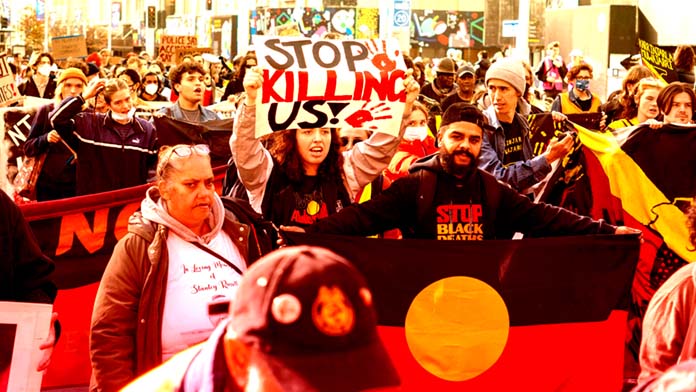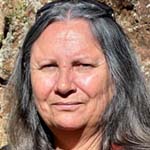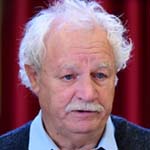Many Indigenous people are sceptical about the planned Voice to parliament, despite the media focus on its support. Solidarity spoke to Indigenous activists Callum Clayton-Dixon, Suellyn Tighe and Michael Mansell about the problems with the proposal
Callum Clayton-Dixon: ‘Parliament doesn’t have to listen to anything this Voice says’
What kind of powers would the Voice to Parliament have?
It helps to go back and look at how and why the ‘Voice’ model was originally formulated as a proposal. It wasn’t something that was conceived out of any grassroots Aboriginal movement. It was designed to appeal to the conservative side of politics who don’t want anything that they can’t control.
The constitutional amendments that are being proposed give this body no powers. They only state that there shall be this so-called Voice with the role of providing advice, comment or representation on particular issues to the parliament. We’ve had advisory bodies for decades and decades now in Aboriginal Affairs and this is just the latest iteration.
The parliament has complete say over the roles, responsibilities and membership of this body. Albanese says it’s going to be “subservient” to the parliament. There’s no guarantee at all that Parliament has to listen to or act on anything that this Voice says.
Why do you think Labor is pushing it?
The push for constitutional recognition has been going on for decades now. Ten or so years ago, there was the You Me Unity campaign, which became Recognise. Now there’s the ‘Voice’. The kinds of constitutional ‘recognition’ proposed thus far have been highly problematic for a multitude of reasons, and the ‘Voice’ model is no different. Consecutive Australian governments have jumped on the constitutional recognition bandwagon in one way or another, using it as a way of trying to look like they’re doing the right thing.
I think the picture that Labor is trying to paint of where the ‘Voice’ model and the mandate for it came from is a dishonest one. There were also fundamental flaws with the so-called consultation process that supposedly arrived at the conclusion that the ‘Voice’ is what people want. And there is no doubt in my mind that the ‘Voice’ model was the predetermined outcome from the get-go.
Many of the prominent opponents of the Voice are from the right, including the Nationals, or racists like Pauline Hanson. How do you think people should vote in the referendum?
Rather than a ‘no’ campaign run, I hope to see an Aboriginal boycott of the referendum—because it’s a referendum being put up on a dishonest foundation, and because it’s such a flawed model which could actually set back the push for self-determination.
I would rather see no referendum than a failed referendum. If there is no referendum and the government ends up going down a different path in terms of some other sort of more substantial reform, like designated Aboriginal seats in the parliament, that would be a better situation. And instead of spending millions and millions of dollars on such a problematic and pointless referendum, why not use that money for land justice? How many thousands of hectares of ‘private’ land could be put back in the hands of dispossessed Aboriginal communities?
Callum Clayton-Dixon is an Ambēyaŋ man, a founding member of the Anaiwan Language Revival Program and author of Surviving New England
Suellyn Tighe: ‘They have ignored the Gomeroi voice on mining’
I see little to no value in the Voice to parliament while Gomeroi continue to be attacked by these fossil fuel companies.
Gomeroi people have used their voice loud and strong to say no to Santos, yet the state and federal government have supported Santos in the Native Title Tribunal, which has resulted in our native title rights being extinguished.
They have ignored the Gomeroi voice on climate change, and climate change is going to impact us all because it does not discriminate.
I have concerns about the Voice because Albanese talks about the tyranny of powerlessness and then he says don’t sweat the details … First Nations people should not have to have a Voice to parliament to be heard.
The fatal flaw of any advisory group is that they can give advice but there is nothing to commit the government to taking that advice.
Suellyn Tighe is a Gomeroi woman fighting the Santos Narrabri/Pilliga gas project in NSW
Michael Mansell: ‘Most Aboriginal people would say, we want a treaty, we want land back, we don’t want a Voice to parliament’
What’s being proposed in terms of the Voice and why don’t you think it will deliver any real power for Aboriginal people?
If the referendum gets up it will produce an Aboriginal advisory body. That advice can be taken up or ignored.
With all the Aboriginal advisory bodies that have existed over the last 30 or 40 years, how much of their advice has ever been taken up by government?
The effect of it is to permanently marginalise Aboriginal political representation to the level of being advisers, rather than decision-makers. That’s bad enough, but to put it in the Constitution means it’s a permanent mark against Aboriginal people ever having a right to self-determination.
We’re often told that the Voice is something that Aboriginal communities have called for, based on its adoption at the Uluru Convention in 2017. You were at that Convention, what happened there?
It is true that the Uluru Convention agreed to, among other things, a Voice to parliament entrenched in the Constitution.
But for the advocates of the Voice to claim that the proposal had support from Uluru is mischievous.
The group who are pushing for the Voice to parliament controlled the Convention so that you had to vote against all of the propositions, that is a treaty, sovereignty and truth-telling, if you wanted to vote against the Voice.
Back in 2016 when the preliminary dialogues leading up to Uluru took place, Tasmania voted in total opposition to the Voice to parliament. Noel Pearson came down to Tasmania and argued in favour of the Voice to parliament model and the 110 Aboriginal delegates simply rejected it out of hand.
Melbourne did the same but I was told later that the way the vote was carried out gave the impression that both Victoria and Western Australia supported the Voice to parliament, when in fact there was a lot of dissent.
My guess is that most Aboriginal people are opposed to it. But I don’t have any hard data to show that is the case. The claim by the proponents of the Voice that there is Aboriginal support is equally based on guesswork.
Since Uluru in 2017 there has been not a single Aboriginal community meeting anywhere in the country to find out if Aboriginal people support it. One of the reasons why is they are concerned that most Aboriginal people would say, we want a treaty, we want land back, we want real empowerment, we don’t want constitutional recognition and we don’t want a Voice to parliament.
Given that, why do you think the Voice has been taken up so enthusiastically by the Labor government?
Albanese is taking the easy way out by getting people to vote in favour of improving the image of the Labor party on Aboriginal policy without having to give any form of empowerment, without having to run the risk of a clash with the mining companies and the states, if they legislate to give land back to Aboriginal people, or a clash with the redneck shock-jock radio hosts.
Why do you believe a treaty is more important than the Voice?
Aboriginal people been calling for a treaty now for nearly 50 years. When the first national Aboriginal body called the National Aboriginal Conference was formed in 1975, they proposed a national treaty.
The federal Reconciliation Council’s Report proposed a federally legislated treaty and at Uluru that was the primary concern and focus of most of the Aboriginal delegates.
The other advantage of a federal treaty is that it provides actual results rather than being a symbolic gesture. The Voice to parliament can only comment on things inside the federal parliament, it can’t provide land to Aboriginal people, it cannot provide services or distribute resources to the Aboriginal community.
On the other hand, you can’t have a treaty with Aboriginal people that does not deliver land. There would have to be some form of national empowerment and the idea of six Aboriginal seats in the Senate, one from each state, could be incorporated.
There would have to be a national Aboriginal representative body to determine the priority of needs of Aboriginal people. It would have to have a guarantee of resources, probably 3 per cent of Australia’s gross domestic product. A treaty requires government commitment to do something that is real and practical and it delivers things that the Voice to parliament could not even contemplate, let alone bring about.
Do you think people should vote against it in the referendum?
They should vote against it. If you are voting on solid moral and political grounds, you don’t have to worry about the reasons that other people are voting for. Anyone who supports Aboriginal people and believes that Aboriginal people are entitled to an equal form of access to political power could not possibly vote in favour of this advisory body.
The argument of Noel Pearson and Megan Davis is that it needs to be in the Constitution to give it permanency. But anyone who thinks that the body would be permanent because it’s in the Constitution is plainly wrong.
We’ve already seen that in section 101 of the Constitution there are very clear words there shall be an interstate commission. There isn’t one, and it hasn’t existed since 1950, when the federal parliament lost interest in it, didn’t set it up and didn’t fund it. Just because you put a Voice to parliament in the Constitution does not bind any government to carry it out.
It’s constitutional recognition dressed up as giving some sort of benefit to Aboriginal people which, when you dissect it, condemns us permanently to a marginalised position. It is racist and it stinks and people should vote against it.
Michael Mansell is an Aboriginal lawyer and activist, secretary of the Aboriginal Provisional Government and chairman of the Aboriginal Land Council of Tasmania









